初一七年级英语语法时态精讲
初一英语常见的时态讲解及例句
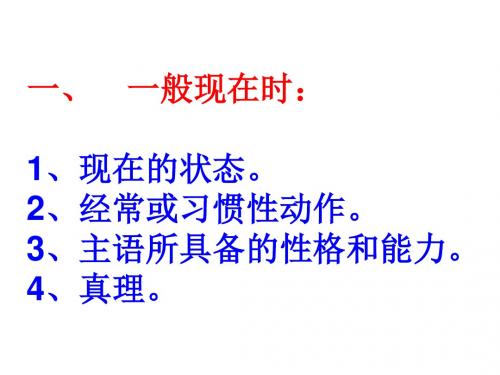
练习: 1. Jim ______(take) photos in the park now. 2. Jim_______(not take) in the park now.
3. _____Jim_____(take) photos in the park now? Yes, he _____. No, he _______. 4. Where _________Jim ____________ photos now? In the park.
10.They _____(be) frห้องสมุดไป่ตู้m Canada They______(not speak) Chinese.
11. He wants _____ (be) tall.
1.我们正在吃晚餐。 We ___________________
2、我们每天6点起床。 We _________ at six every day.
4. You and I ___(not be) in Class Six. 5.___(be) there a supermarket on the Fifth Avenue? Yes, there_____ (be). 6. ____ her parent tall? No, he____.
1)His parents _______(watch) TV every night. 肯定句 2) My brother _________(do) homework every day. 3)His parents _______(not watch) every night.否定句 4)My brother________(not do)homework every day.
时态复习的思维步骤应是: 一时间、 二主语、 三动词。
初中英语五种时态讲解
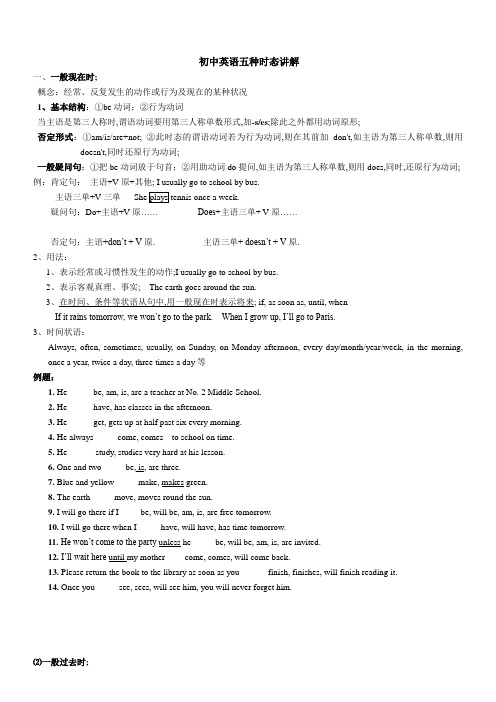
初中英语五种时态讲解一、一般现在时;概念:经常、反复发生的动作或行为及现在的某种状况1、基本结构:①be动词;②行为动词当主语是第三人称时,谓语动词要用第三人称单数形式,加-s/es;除此之外都用动词原形;否定形式:①am/is/are+not; ②此时态的谓语动词若为行为动词,则在其前加don't,如主语为第三人称单数,则用doesn't,同时还原行为动词;一般疑问句:①把be动词放于句首;②用助动词do提问,如主语为第三人称单数,则用does,同时,还原行为动词; 例:肯定句:主语+V原+其他; I usually go to school by bus.主语三单+V三单疑问句:Do+主语+V原…… Does+主语三单+ V原……否定句:主语+don’t + V原. 主语三单+ doesn’t + V原.2、用法:1、表示经常或习惯性发生的动作;I usually go to school by bus.2、表示客观真理、事实; The earth goes around the sun.3、在时间、条件等状语从句中,用一般现在时表示将来; if, as soon as, until, whenIf it rains tomorrow, we won’t go to the park. When I grow up, I’ll go to Paris.3、时间状语:Always, often, sometimes, usually, on Sunday, on Monday afternoon, every day/month/year/week, in the morning, once a year, twice a day, three times a day等例题:1. He______be, am, is, are a teacher at No. 2 Middle School.2. He______have, has classes in the afternoon.3. He______get, gets up at half past six every morning.4. He always _____come, comes to school on time.5. He ______study, studies very hard at his lesson.6. One and two _____be, is, are three.7. Blue and yellow _____make, makes green.8. The earth _____move, moves round the sun.9. I will go there if I ____ be, will be, am, is, are free tomorrow.10. I will go there when I _____have, will have, has time tomorrow.11. He won’t come to the party unless he _____be, will be, am, is, are invited.12. I’ll wait here until my mother ____come, comes, will come back.13. Please return the book to the library as soon as you ______finish, finishes, will finish reading it.14. Once you _____see, sees, will see him, you will never forget him.⑵一般过去时;1、⑴表示过去某个时间发生的动作或存在的状态; I got up late this morning.⑵表示过去的习惯或经常发生的动作;When I was in the countryside. I often swam in the river. I used to go fishing.2、结构:基本结构:①be动词;②行为动词否定形式:①was/were+not; ②在行为动词前加didn't,同时还原行为动词;一般疑问句:①was或were放于句首;②用助动词do的过去式did 提问,同时还原行为动词;例:肯定句:主语+ V过去+其他;疑问句:Did+主语+ V原……否定句:主语+didn’t+ V原3、动词的规则变化;4、时间状语:Yesterday, last night/week/year/month, last Sunday, in 1995, the other day, just now, ago等例题:1. He____be, was, were, been here a moment ago.2. They ____be, was, were, been here just now.3. The scientists _____leave, leaves, leaved, left for America yesterday.4. Last week we ______visit, visited the Science Museum.5. When I was a child, I often ____play, played football.6. The students ran out of the classroom as soon as the bell ____ring, rang, rung.⑶一般将来时;①肯定句:否定句:注:当主语为I 或we时,问句中可用shall where shall we meet tomorrow②be going to+ V原表示计划、打算做某事;用来表示近期或事先考虑过的将要发生的动作以及已有迹象表明必将发生某事,意为“打算;就要”; be going to do 将要干某事---what are you going to do next Sunday ---I am going to listen to music.Look at the clouds, there is going to rain.③现在进行时be +Ving 有时可以表示将来;常用这种结构的动词:go, come, leave, stay, start, arrive We’re leaving for London.例题:1 . _____you ____a doctor when you grow upA .Will; going to be B. Are; going to be C. Are; / D .Will; be2. I don’t know if his uncle _____. I think he _____ if it doesn’t rain.A will come; comesB will come; will comeC comes; comesD comes; will come3 . He will be back _____a few minutes.A withB forC onD in4. What time _____we meet at the gate tomorrowA willB shallC doD are5. He will have a holiday as soon as he _____the work next week.A finishes B. doesn’t finish C will finish D won’t finish6 .There _____some showers this afternoon.A will beB will haveC is going to beD are going to have7. It ____my brother’s birthday tomorrow. She _____a party.A is going to be; will haveB will be; is havingC will be; is going to haveD will have; is going to be8. Li Ming is 10 years old now, next year he _____11.A isB is going to beC will beD will to be与will区别:两者都可表示将要发生的事、将要去做某事,但它们有如下几点区别:1. 表示近期、眼下就要发生的事情,will 表示的将来时间则较远一些,如:He is going to write a letter tonight.He will write a book .2. 表示根据主观判断将来肯定发生的事情,will表示客观上将来势必发生的事情;He is seriously ill. He is going to die.He will be twenty years old.3. be going to 含有“计划,准备”的意思,而will 则没有这个意思,如:She is going to lend us her book.He will be here in half an hour.4.在有的主句中,一般不用be going to, 而多用will, 如:If any beasts comes at you, I'll stay with you and help you4现在进行时1、构成:肯定句:主语+ is / am / are +ving疑问句:Is /Am /Are + 主语+ving否定句:主语+ isn’t / am not / aren’t + ving2、用法:①表示正在进行的动作I’m reading book now.②表示现阶段正在进行的动作或状态; They are studying hard this term.3、时间状语:now , these days, 当句中有look, listen , can’t you see, can you see时Listen He is singing.例题:1. I ____write, am writing, is writing, are writing a letter now.2. Look, it _____begin, is beginning, am beginning, are beginning to rain.3. They ____study, is studying, am studying, are studying medicine at the Medical Institute of Chengde these days.4. He _____teach, am teaching, is teaching, are teaching an English lesson at this time.5 过去进行时1、结构was / were + doing2、用法①表示过去某段时间正在进行的动作---what were you doing at 9:30 last night --- I was watching TV.3、when一般接一般过去时I was doing my homework whenwhile一般接进行时WhileHe was playing basketball while she was reading books.例题:1. I _____cook, cooked, was cooking, were cooking breakfast when you arrived.____you_____ do, did, was...doing, were…doing at this time yesterday eveninghave, are having, had, were having dinner when the doorbell rang.When/ As we____ have, had, are having, were having dinner, the doorbell rang.动词基本变化形式:。
人教版七年级上册英语时态讲解
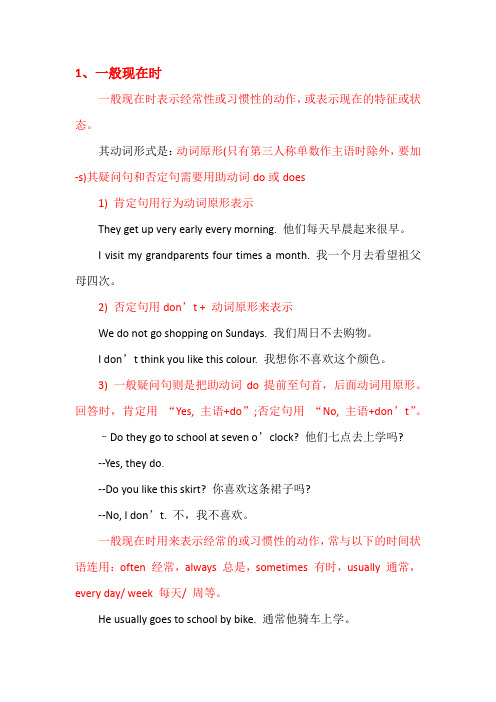
1、一般现在时一般现在时表示经常性或习惯性的动作,或表示现在的特征或状态。
其动词形式是:动词原形(只有第三人称单数作主语时除外,要加-s)其疑问句和否定句需要用助动词do或does1) 肯定句用行为动词原形表示They get up very early every morning. 他们每天早晨起来很早。
I visit my grandparents four times a month. 我一个月去看望祖父母四次。
2) 否定句用don’t + 动词原形来表示We do not go shopping on Sundays. 我们周日不去购物。
I don’t think you like this colour. 我想你不喜欢这个颜色。
3) 一般疑问句则是把助动词do提前至句首,后面动词用原形。
回答时,肯定用“Yes, 主语+do”;否定句用“No, 主语+don’t”。
–Do they go to school at seven o’clock? 他们七点去上学吗?--Yes, they do.--Do you like this skirt? 你喜欢这条裙子吗?--No, I don’t. 不,我不喜欢。
一般现在时用来表示经常的或习惯性的动作,常与以下的时间状语连用:often 经常,always 总是,sometimes 有时,usually 通常,every day/ week 每天/ 周等。
He usually goes to school by bike. 通常他骑车上学。
I visit my grandparents every week. 我每个星期都去看祖父母。
She is always late for class. 她总是上课迟到。
My parents and I sometimes go out to eat. 我和父母有时出去吃饭。
It often rains here. 这儿常常下雨。
初一英语时态总结
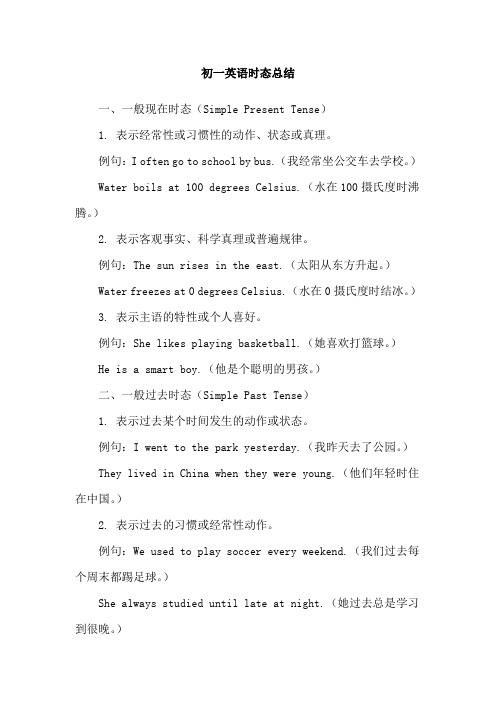
初一英语时态总结一、一般现在时态(Simple Present Tense)1. 表示经常性或习惯性的动作、状态或真理。
例句:I often go to school by bus.(我经常坐公交车去学校。
) Water boils at 100 degrees Celsius.(水在100摄氏度时沸腾。
)2. 表示客观事实、科学真理或普遍规律。
例句:The sun rises in the east.(太阳从东方升起。
)Water freezes at 0 degrees Celsius.(水在0摄氏度时结冰。
) 3. 表示主语的特性或个人喜好。
例句:She likes playing basketball.(她喜欢打篮球。
)He is a smart boy.(他是个聪明的男孩。
)二、一般过去时态(Simple Past Tense)1. 表示过去某个时间发生的动作或状态。
例句:I went to the park yesterday.(我昨天去了公园。
) They lived in China when they were young.(他们年轻时住在中国。
)2. 表示过去的习惯或经常性动作。
例句:We used to play soccer every weekend.(我们过去每个周末都踢足球。
)She always studied until late at night.(她过去总是学习到很晚。
)3. 表示过去的真理或规律。
例句:Dinosaurs existed millions of years ago.(恐龙存在于几百万年前。
)The Earth was flat according to ancient beliefs.(根据古代的信仰,地球是平的。
)三、一般将来时态(Simple Future Tense)1. 表示将来某个时间或在某个时间之后发生的动作或状态。
例句:I will visit my grandparents next week.(下周我会去看望我的祖父母。
七年级英语时态结构知识点
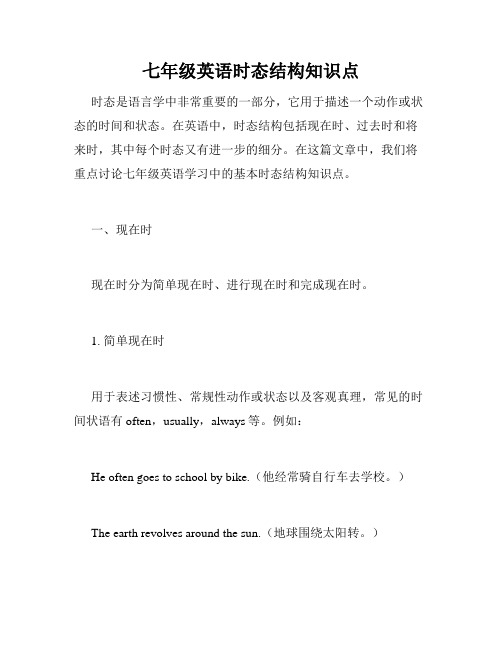
七年级英语时态结构知识点时态是语言学中非常重要的一部分,它用于描述一个动作或状态的时间和状态。
在英语中,时态结构包括现在时、过去时和将来时,其中每个时态又有进一步的细分。
在这篇文章中,我们将重点讨论七年级英语学习中的基本时态结构知识点。
一、现在时现在时分为简单现在时、进行现在时和完成现在时。
1. 简单现在时用于表述习惯性、常规性动作或状态以及客观真理,常见的时间状语有often,usually,always等。
例如:He often goes to school by bike.(他经常骑自行车去学校。
)The earth revolves around the sun.(地球围绕太阳转。
)2. 进行现在时用于描述正在进行的动作,常见的时间状语有now,at the moment,currently等。
例如:I am watching TV at the moment.(我正在看电视。
)They are playing football now.(他们正在踢足球。
)3. 完成现在时用于表述一项动作已经完成,常见的时间状语有already,yet,just等。
例如:I have finished my homework already.(我已经完成了我的作业。
)She has just left.(她刚离开。
)二、过去时过去时分为简单过去时、进行过去时和完成过去时。
1. 简单过去时用于表述已经完成的过去的动作或状态。
例如:I went to Beijing last year.(我去年去了北京。
)We studied English in school.(我们在学校学英语。
)2. 进行过去时用于描述过去某个特定时间正在进行的动作。
例如:I was cooking dinner at 6 o’clock yesterday.(昨天六点我正在做晚饭。
)They were playing basketball when it started raining.(下雨时他们正在打篮球。
完整人教版七年级英语时态知识点解析
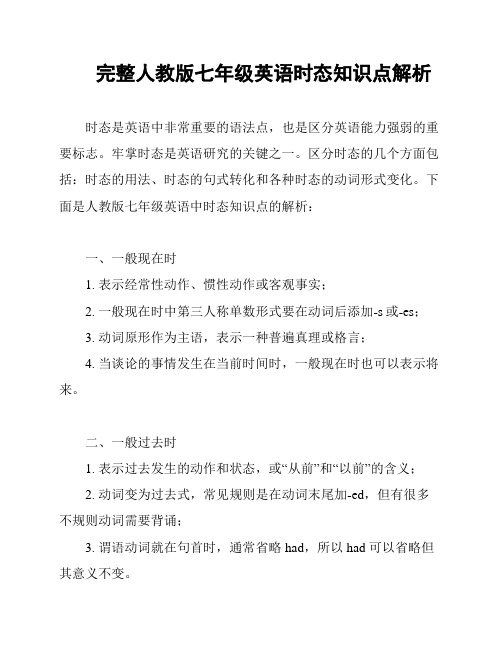
完整人教版七年级英语时态知识点解析时态是英语中非常重要的语法点,也是区分英语能力强弱的重要标志。
牢掌时态是英语研究的关键之一。
区分时态的几个方面包括:时态的用法、时态的句式转化和各种时态的动词形式变化。
下面是人教版七年级英语中时态知识点的解析:一、一般现在时1. 表示经常性动作、惯性动作或客观事实;2. 一般现在时中第三人称单数形式要在动词后添加-s或-es;3. 动词原形作为主语,表示一种普遍真理或格言;4. 当谈论的事情发生在当前时间时,一般现在时也可以表示将来。
二、一般过去时1. 表示过去发生的动作和状态,或“从前”和“以前”的含义;2. 动词变为过去式,常见规则是在动词末尾加-ed,但有很多不规则动词需要背诵;3. 谓语动词就在句首时,通常省略 had,所以 had 可以省略但其意义不变。
三、一般将来时1. 表示将来的动作或存在的状态,意义上相当于“将要”;2. 一般将来时通常要用助动词will(shall),用于第一人称时,也可以使用 shall;3. “be going to+动词原形”也是表示将来的另一种方式。
四、现在进行时1. 表示现在正在进行或发生的动作;2. 由“be +现在分区”构成,be 动词的形式与主语一致,现在分词则在动词原形后添加-ing;3. 时间状语:now,at present,right now 等,用于强调正在发生的动作。
五、过去进行时1. 表示过去某一时刻正在进行的动作;2. 由“was / were+现在分词”构成,was / were 动词的形式与主语一致,现在分词则在动词原形后添加-ing;3. 时间状语:at that time,at six o’clock yesterday evening 等。
六、将来进行时1. 表示“将来某一时刻正在进行的动作”;2. 由“will be +现在分词”构成;3. 这种时态比较少见,常被其他时态所替代。
七、现在完成时1. 表示过去某个不确定的时间开始,持续到现在还未结束的动作;2. 由“have / has +过去分词”构成,have 和 has 用于不同的人称,动词的过去分词形式在常规情况下为动词原形+ed,但也有很多特殊情况需要特别记忆。
初中英语时态讲解
初中英语时态讲解(实用版)目录1.初中英语时态的分类2.一般现在时的概念和用法3.一般现在时的构成和时间状语4.一般现在时的肯定式和否定式5.一般现在时的例句正文初中英语时态讲解英语时态是英语语法中的重要组成部分,它能够帮助我们准确地表达不同时间发生的动作或状态。
初中英语时态主要分为 16 种,其中包括一般现在时、一般过去时、一般将来时和过去将来时,以及这四者的进行时、完成时和完成进行时。
在这篇文章中,我们将详细讲解初中英语中常见的八种基本时态之一的一般现在时。
一般现在时表示经常性、习惯性的动作或状态,或者表示客观事实、自然规律等。
它通常用来描述日常生活中经常发生的事情,或者是一种习惯性的行为。
在构成上,一般现在时由动词的原形和时间状语组成。
当主语是第三人称单数时,动词需要加 s 或 es。
一般现在时的时间状语包括:always(总是)、usually(通常)、often (经常)、sometimes(有时)、every(每)等等。
这些时间状语可以帮助我们更加准确地描述动作或状态发生的频率。
在一般现在时中,肯定式表示动作或状态的存在,否定式则表示动作或状态的不存在。
例如,肯定式为“I am a student”,否定式为“I am not a student”。
以下是一些一般现在时的例句:1.I always go to school by bike.(我总是骑自行车上学。
)2.She usually cooks dinner for us.(她通常为我们做晚饭。
)3.He often goes to the park on weekends.(他经常在周末去公园。
)4.They sometimes watch movies in the evening.(他们有时在晚上看电影。
)5.Every morning, I eat an apple.(每天早上,我吃一个苹果。
)通过以上例句,我们可以看到一般现在时在描述经常性、习惯性的动作或状态时的用法。
初一时态与语态详解
初一时态与语态详解英语学习中,时态和语态是非常重要的概念。
初一阶段的学生常常面临对时态和语态的混淆和困惑。
本文将详细解释初一阶段需要掌握的时态和语态相关知识,帮助学生们更好地理解和运用。
一、时态1. 一般现在时态(Simple Present)一般现在时态用于描述经常性或普遍性的动作、习惯或真理。
例如:I play basketball every day. (我每天打篮球。
)2. 现在进行时态(Present Continuous)现在进行时态表示现在正在进行的动作。
例如:She is studying in the library. (她正在图书馆学习。
)3. 一般过去时态(Simple Past)一般过去时态用于描述过去发生的动作或状态。
例如:He watched a movie yesterday. (他昨天看电影了。
)4. 过去进行时态(Past Continuous)过去进行时态表示过去某个时刻正在进行的动作。
例如:I was reading a book at that time. (那时我正在读书。
)5. 一般将来时态(Simple Future)一般将来时态用于描述将来会发生的动作或事件。
例如:They will visit their grandparents next week. (下周他们将会拜访他们的祖父母。
)6. 现在完成时态(Present Perfect)现在完成时态表示过去发生的动作对现在产生的影响或结果。
例如:She has washed the dishes. (她洗过了碗。
)7. 过去完成时态(Past Perfect)过去完成时态用于描述过去某个时间之前已经发生的动作。
例如:I had finished my homework before he arrived. (他到达之前我已经完成了我的作业。
)8. 将来完成时态(Future Perfect)将来完成时态表示将来某个时间之前将会完成的动作。
七年级全册时态知识点
七年级全册时态知识点时态是语法学习中非常重要的一个部分,是用来表达动作发生的时间和状态的一种语法形式。
在英语学习中,时态的正确使用非常重要,因为时态能够帮助我们更好地表达我们想要表达的意思。
在七年级的英语学习中,学生需要掌握一些基本的时态知识点,下面就让我们来详细了解一下这些知识点。
一、一般现在时一般现在时表示目前正在发生的事情或者经常发生的事情。
在句子中,一般现在时的动词不需要加s或es。
例如:I eat lunch at 12 o'clock every day.(我每天中午12点吃午饭。
)He plays basketball every weekend.(他每个周末打篮球。
)二、一般过去时一般过去时表示过去发生的动作或者状态。
在句子中,一般过去时的动词需要加ed。
例如:I watched TV last night.(昨晚我看了电视。
)She studied English for two hours yesterday.(她昨天学习英语两个小时。
)三、一般将来时一般将来时表示将要发生的事情。
在句子中,一般将来时需要使用will或者be going to。
例如:I will go to the movie theater tomorrow.(我明天会去电影院。
)He is going to visit his grandparents next weekend.(他下个周末去看望他的祖父母。
)四、现在进行时现在进行时表示目前正在进行中的动作。
在句子中,现在进行时需要使用be动词加动词ing。
例如:I am studying for the test right now.(我现在正在为考试学习。
)She is watching a movie at home.(她正在家里看电影。
)五、过去进行时过去进行时表示过去某个时刻正在进行的动作。
在句子中,过去进行时需要使用was或were加动词ing。
七年级英语时态总结
七年级英语时态总结一、一般现在时。
1. 概念。
- 表示经常或习惯性的动作或存在的状态。
例如:I often go to school by bike.(我经常骑自行车去上学。
)He is a student.(他是一名学生。
)2. 构成。
- be动词:主语为第一人称单数(I)时用am;主语为第三人称单数(he/she/it 等)时用is;主语为复数(we/you/they等)或第二人称单数(you)时用are。
例如:I am a girl. He is my brother. They are my friends.- 实义动词:- 当主语为第三人称单数时,动词要加 -s或 -es。
例如:He likes reading books.(like变成likes)- 当主语为其他人称时,动词用原形。
例如:We play football on Sundays.3. 时间状语。
- 常与often(经常), usually(通常), sometimes(有时), always(总是), every day/week/month/year(每天/周/月/年)等连用。
例如:She usually gets up at six o'clock.二、现在进行时。
1. 概念。
- 表示现在正在进行的动作或存在的状态。
例如:Look! They are playing basketball.(看!他们正在打篮球。
)2. 构成。
- be动词(am/is/are)+动词的 -ing形式。
例如:I am reading a book. Heis watching TV. They are having lunch.3. 动词 -ing形式的构成规则。
- 一般在动词原形末尾加 -ing。
如:go - going, play - playing。
- 以不发音的字母e结尾的动词,先去掉e,再加 -ing。
如:write - writing, have - having。
- 1、下载文档前请自行甄别文档内容的完整性,平台不提供额外的编辑、内容补充、找答案等附加服务。
- 2、"仅部分预览"的文档,不可在线预览部分如存在完整性等问题,可反馈申请退款(可完整预览的文档不适用该条件!)。
- 3、如文档侵犯您的权益,请联系客服反馈,我们会尽快为您处理(人工客服工作时间:9:00-18:30)。
一般现在时态2. Must she __________(stay) at home now?3. What can the boy __________(do) for his parents?4. Tom can’t __________(sing) an English song.5. He may __________(perform) ballet at Kangkang’s birthday party.6. She should __________(help) her parents do some housework.2. Tom and I usually __________(go) to school by bike.3. Does Lin Tao __________(like) reading storybooks?4. What classes do you __________(have) today?5. How often does the girl __________(watch) TV?6. Where do they __________(live) now?7. Every year many people __________(lose) their lives in traffic accidents.8. Sam doesn’t __________(get) up early in the morning.9. Each of them __________(have) a nice schoolbag.10. They each __________(sleep) late at night.She __________ __________ a blue dress.2. I am from Qijiang.(变一般疑问句)__________ __________ from Qijiang?3. Are the storybooks very interesting?(否定回答)No, __________ __________.4. His parents are both workers.(变一般疑问句)__________ his parents __________ workers?5. There are some nice books on the shelf.(对划线部分提问)__________ __________ on the shelf?My mother __________ __________ speak a little English.2. We should be careful when we cross the street.(变一般疑问句)__________ __________ be careful when we cross the street?3. Must I finish my homework at once?(作肯定和否定回答)Yes, __________ __________.No, __________ __________.4. Tom can recite a Chinese poem.(对划线部分提问)What __________ Tom __________?五、They __________ often __________ the piano louldy.2. Jim learns English well.(变一般疑问)__________ Jim __________ English well?3. She likes Sichuan food very much.(对划线部分提问)What __________ she __________ very much?4. Do the boys usually play football after school?(作肯定回答)Yes, __________ __________.5. She usually does some cooking in the evening.(变否定句)She usually __________ __________ any cooking in the evening.6. I want to do some shopping.(变一般疑问句)__________ you __________ to do any shopping?7. Tom often wathes TV at night.(对划线部分提问)What __________ Tom often __________ at night?8. They sometimes go swimming in the afternoon.(对划线部分提问)What __________ they sometimes __________ in the evening?一般过去时【练习】2. When __________(be) you born?3. Maria __________(be) born in Cuba.4. The weather yesterday __________(be) very cold.5. They __________(be) very happy at Kangkang’s birthday party yesterday.6. What __________(be) the date the day before yesterday?7. __________(be) you at home a moment ago?8. Where __________(be) your parents last Saturday?9. My mother __________(be not) in Chongqing last month.10. How __________(be) the weather this morning?2. __________(can) they dance the disco last year?3. I __________(can not) sleep well last night.4. What __________(can) you do just now?2. She __________(watch) TV late yesterday evening.3. We __________(clean) up our classroom a moment ago.4. __________ they __________(have) any bread this morning?5. What __________ you __________(do) the day before yesterday?6. Tom __________(go) to visit the Great Wall last year.7. Mr. Wang __________(sing) an English song just now.8. __________ Lin Tao have a good time at the party last Sunday?9. We __________(not porform) ballet yesterday. We __________(recite) a poem.10. The wind yesterday __________(blow) strongly.__________ you __________ in a small town?2. Sam was a little boy at that time.(变为否定句)Sam __________ __________ little boy at that time.3. His friends were in the library just now.(对划线部分提问)__________ __________ his friends just now?4. Were they very happy yesterday?(作否定回答)No, __________ __________.5. Was your brother born in Chongqing?(作肯定回答)Yes, __________ __________.__________ you __________ English songs when you were five?2. The boy could ride a bike last year.(变否定句)The boy __________ __________ a bike last year.3. They could play a game yesterday.(对划线部分提问)What __________ they __________ yesterday?4. Could your friends cook food last Sunday?(作肯定回答)Yes, __________ __________.I __________ __________ to Sichuan with my friends during summer holidays.2. She recited a poem at Kangkang’s birthday party.(变一般疑问句)__________ she __________ a poem at Kangkang’s birthday party?3. They did their homework half an hour ago.(变否定句)They __________ __________ their homework half an hour ago.4. Tom sang a song beautifully yesterday.(对划线部分提问)What __________ Tom __________ yesteray?5. Jim took many pictures in winter holidays.(变一般疑问句)__________ Jim __________ many pictures in winter holidays?6. Did the kid hurt himself just now?(做否定回答)No, __________ __________.7. They knew the girl in blue well?(对划线部分提问)Who __________ they __________ well?8. I forgot to close the door yesterday evening.(对划线部分提问)What __________ you __________ to do yesterday evening?现在进行时【练习】一、用所给词的适当形式填空。
